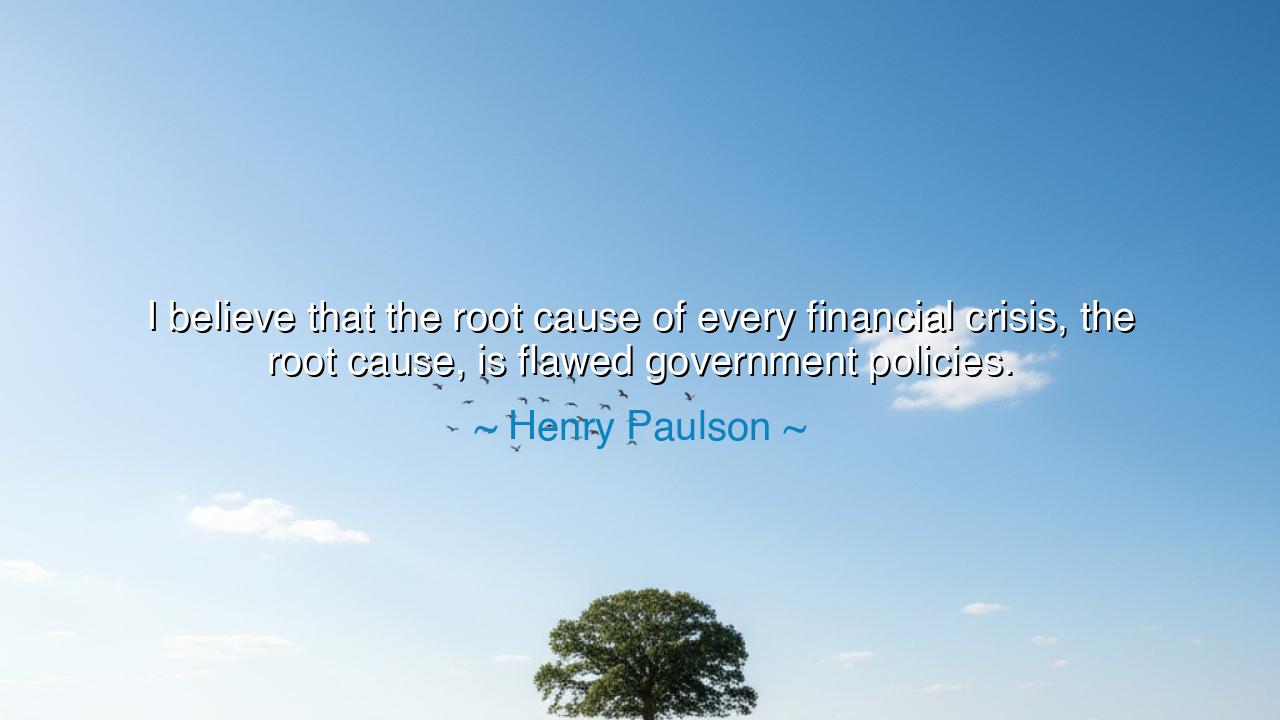
I believe that the root cause of every financial crisis, the root
I believe that the root cause of every financial crisis, the root cause, is flawed government policies.






The words of Henry Paulson — “I believe that the root cause of every financial crisis, the root cause, is flawed government policies.” — strike like a hammer upon the anvil of history. They remind us that behind every collapse of markets and ruin of nations, beyond the greed of traders and the folly of crowds, lies a deeper sickness: the failure of governance. In this saying, Paulson, a man who walked amid the storm of the 2008 financial crisis, speaks not only as a statesman but as a witness to the ancient truth that when the laws of men distort the laws of economics, disaster follows. Flawed government policies — born of pride, fear, or ignorance — are the seeds from which chaos grows.
Paulson’s insight comes from experience forged in crisis. As the United States Secretary of the Treasury during the great collapse of 2008, he saw firsthand how years of misplaced confidence and misguided regulation led to the near-fall of the global economy. Governments had built systems that rewarded excess, encouraged debt, and ignored risk — believing that prosperity could be commanded by decree. But the markets, like the tides, obey no king. When those tides turned, the illusions of control were shattered. The crash was not merely the fault of bankers or speculators, but of policies that fed their recklessness, of leaders who mistook manipulation for management.
In truth, the wisdom of Paulson’s words echoes far beyond his age. The ancients, too, knew that bad governance breeds ruin, even when intentions seem noble. In the time of Rome, emperors debased their coinage to fund wars and appease the masses, believing they could create wealth by decree. Yet the silver that once filled their coins was replaced by base metal, and with it vanished the trust of the people. Prices soared, trade faltered, and the empire decayed from within. Thus did the mightiest civilization of its age fall not to barbarian swords, but to its own flawed policies — decisions that corrupted the very foundation of its economy: faith.
It is a lesson that repeats through the ages. The Great Depression of the 1930s was deepened by the governments that tightened credit and raised tariffs, believing they could protect their nations through isolation. Instead, they strangled trade and worsened misery. The Asian financial crisis of the 1990s arose from policies that bound currencies too tightly to false promises, while the people suffered the consequences of their leaders’ arrogance. In every age, the pattern endures: when rulers seek to bend reality to their will, rather than govern with humility before the truth, the invisible laws of balance and consequence will correct them with fury.
Paulson’s statement is therefore not a condemnation, but a warning. He does not say that governments are evil, but that they are fragile instruments — easily corrupted by good intentions untempered by wisdom. Power, when it seeks to control what should be guided, becomes destruction disguised as order. The markets are not moral, but they are merciless: they reveal the flaws of policy without pity or delay. A government that fails to act with foresight and fairness invites the judgment of its own creation.
Yet, within this warning lies hope. For if flawed policies can cause ruin, wise policies can restore balance. The answer is not the absence of government, but the presence of integrity and prudence. A ruler who listens to reason rather than rhetoric, who dares to act for the long term rather than the next election, can shield his people from disaster. In the times following every great crisis — from Roosevelt’s reforms to the rebuilding of Europe after the war — nations have risen again, stronger for the lessons they learned. The path of wisdom begins with humility: to understand that prosperity cannot be decreed, but must be nurtured through justice, discipline, and transparency.
Let this be the teaching for all who govern and all who are governed: prosperity is a trust, not a possession. The wealth of a nation belongs not to its leaders, but to its people, and it must be protected as a sacred charge. Let no government seek to command the tides of trade or shield men from consequence, for in doing so it corrupts both. Let the wise learn to build systems that reward honesty, temper ambition, and prepare for storm even in times of calm.
And so, O listener, remember: a financial crisis is not born in the marketplace, but in the mind of man. It begins when leaders forget that power must serve truth, not shape it. The lesson of Paulson’s words is clear — guard against arrogance, in policy as in life. For when governance forgets its limits, ruin is its reminder. But when wisdom guides the law and fairness guards the economy, the nation stands secure, and the prosperity of the people becomes not a fleeting illusion, but an enduring legacy.






AAdministratorAdministrator
Welcome, honored guests. Please leave a comment, we will respond soon